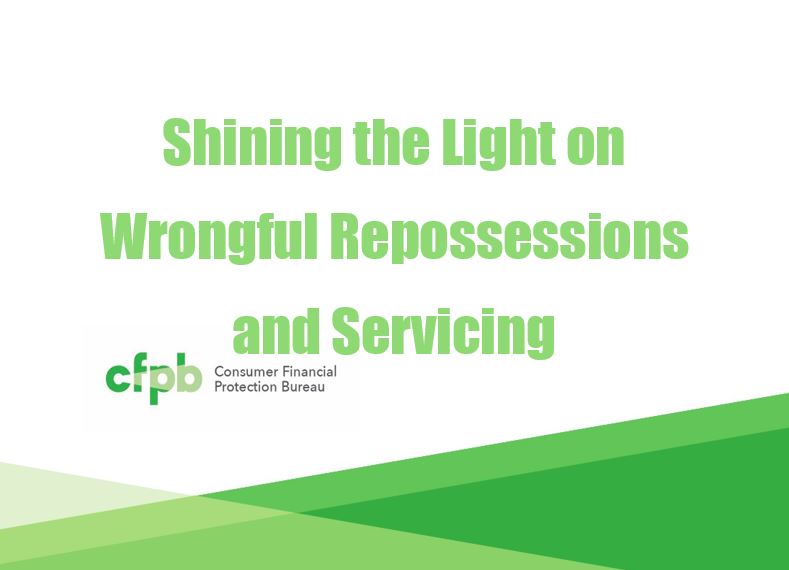“Examiners found that servicers engaged in unfair acts or practices when they erroneously repossessed consumers’ vehicles (a) when their representatives or service providers failed to cancel orders to repossess vehicles, or act on those cancellations,”
On September 7th, the Consumer Financial Protection Bureau (CFPB) released their Fall 2024 Supervisory Highlights Special Edition focused on Auto Finance servicing and repossessions. Amongst its findings were lender infractions ranging from wrongful repossessions to unperfected titles and failures to provide proper and timely refunds on consumers add-on products.
As the CFPB does bi-annually, they’ve released their findings on lender deficiencies in auto loan servicing. And as we tend to see twice a year, wrongful repossessions sit on that list. A clear indicator that some lenders are not reviewing or monitoring their repossession assignments thoroughly. While not all lenders are under the jurisdiction of CFPB exams, these findings are none the less worth note due to them being often perceived by lawyers and judges as “industry best practices.”
Read or Download the Entire Report Here!
While section 1 is focused on front end lending disclosures and Regulation Z, section 2 jumps into the topic of repossessions which we share below.
2.2 Repossession Activities
To secure an auto loan, lenders require borrowers to give creditors a security interest in the vehicle. If a borrower defaults, a creditor may exercise its contractual rights to repossess the secured vehicle. The magnitude of repossessions is significant, with the number of repossessions in 2024 estimated to reach 1.6 million.
Servicers collect and process auto loan or lease payments from borrowers and are either creditors or act on behalf of creditors. Generally, servicers do not immediately repossess a vehicle upon default and instead attempt to contact consumers before repossession, usually by phone or mail. Servicers may give consumers in default the opportunity to avoid repossession by catching up on past-due payments or making promises to pay.
Servicers generally use service providers to conduct repossessions. While some repossessions are unavoidable, Supervision pays particular attention to servicers’ repossession of automobiles. Loan holders and servicers are responsible for ensuring that their repossession related practices, and the practices of their service providers, do not violate the law.
2.2.1 Wrongful Repossession
Examiners found that servicers engaged in unfair acts or practices. An act or practice is unfair when it causes or is likely to cause substantial injury to consumers; the injury is not reasonably avoidable by consumers; and the injury is not outweighed by countervailing benefits to consumers or to competition.
Examiners found that servicers engaged in unfair acts or practices when they erroneously repossessed consumers’ vehicles (a) when their representatives or service providers failed to cancel orders to repossess vehicles, or act on those cancellations, when consumers had made payments or obtained extensions that should have prevented repossessions; and (b) when consumers had requested, or the servicer had approved, a COVID-19 related loan deferment or loan modification, consumers had otherwise made timely payments, or consumers made arrangements to pay an amount sufficient to cancel the repossession.
These practices cause or are likely to cause substantial injury because they create a substantial risk that consumers will be erroneously deprived of their vehicles. Borrowers who are deprived of their vehicles are likely to suffer injury in the form of inability to travel to work and resulting lost wages and by inability to use their vehicles for other critical daily needs.
Consumers could not reasonably avoid the injury because borrowers had no control over the servicers’ repossession practices, including errors relating to payment processing, repossession orders, repossession holds, and their COVID-19 related deferment practices. The injury was not outweighed by any countervailing benefits to consumers or competition.
In response to these findings, the servicers were directed to cease repossessing vehicles and failing to promptly return vehicles when consumers have made timely payments or payment arrangements or have obtained a loan modification sufficient to prevent repossessions. Some servicers also have implemented policies and procedures to ensure that they do not repossess vehicles when consumers have made payments or obtained extensions sufficient to prevent repossessions.
2.2.2 Repossessing Third Parties’ Vehicles Without a Recorded Lien
Examiners found that servicers engaged in unfair acts or practices when they failed to record liens and then repossessed vehicles without a valid lien. When assigning vehicles for repossession, servicers did not verify that they had a valid lien. As a result, they repossessed vehicles from consumers who did not have any prior affiliation with the servicers.
Servicers had no right to repossess these vehicles because they did not have a valid lien and, by repossessing them, they caused substantial injury in the form of lost wages, the costs of arranging alternative transportation, or being deprived of the ability to meet other important needs. Consumers could not reasonably foresee that their vehicle would be repossessed by servicers with which they did not have any prior relationship or affiliation.
The injury to consumers was not outweighed by countervailing benefits to consumers or competition, including the cost of implementing controls to prevent wrongful repossessions. In response to these findings, servicers implemented policies and procedures to ensure that they recorded liens for all vehicles and repossessed vehicles only when they had recorded a lien.
2.3 Servicing Practices
Aside from the repossession process is the post repossession process, which in many cases also pertains to non-repossessed collateral that become subject of early cancellations due to total losses or trade-ins.
For those of us in California, Colorado and a handful of other states, we have already been wrestling with managing refunds on dealer sold “guaranteed asset protection” (GAP) products. This process is time consuming and requires dealer cooperation and or direct contact and pursuit of the product providing companies themselves.
Unfortunately, the onus is primarily on the lenders to pursue and manage this at the risk of non-compliance and punitive action while the dealers and insurers are for the most held with no written legal ramifications for non-compliance, at least in California that is.
Of curious findings is the issue of lenders collecting payments when GAP claims are pending. A fairly common practice that many lenders may not be aware is deemed as unfair. Read below.
2.4 Add-on Products
When consumers purchase an automobile, auto dealers and finance companies typically offer consumers add-on products. These products generally fall into one of two categories, credit products and vehicle products. Credit products will assist with the remaining loan balance owed by the consumer under certain circumstances; these products cease to provide any benefits when the loan is terminated.
For example, “guaranteed asset protection” (GAP) products are credit products that are offered to help pay off the loan if the car is totaled or stolen. Vehicle products relate to the vehicle itself; these products may continue to provide benefits after the loan is terminated.
For example, consumers may purchase a vehicle service contract to pay for the cost of certain repairs. The add-on products apply only for specific periods, and only under certain circumstances. Dealers and finance companies often charge consumers all payments for add-on products as a lump sum at origination. Dealers and finance companies generally include the lump sum cost of add-on products as part of the vehicle financing agreement, and consumers typically make payments for these products throughout the loan term.
The add-on products often allow consumers to cancel early for a partial refund of the product cost. Upon early termination, the account generally is eligible for a pro rata refund of the prepaid premiums for the unused portion of the products – often called “unearned” premiums. In the default scenario, the refund amount should be applied to any deficiency balance, and the borrower receives any remaining refund amount. For early payoffs, the full amount of the refund should go to the borrower.
When the loan terminates early, credit products no longer offer any possible benefit to consumers because coverage is tied to the financed loan, which is paid off. Absent a refund, consumers may wind up paying for services they can no longer use, as the relevant products terminate when the loan terminates. In addition, vehicle products such as service contract coverage terminate upon default, when the borrower no longer possesses the vehicle.
2.4.6 Failure to Ensure Refunds of Unearned Premiums
Examiners found that servicers engaged in unfair acts or practices by failing to ensure consumers received refunds of unearned premiums for add-on products upon early termination of their auto loans in all states, either by ensuring that dealers or administrators provided refunds or by providing the refunds themselves.
This practice caused or was likely to cause substantial injury to borrowers because these products were of no value once borrowers’ loans were terminated due to early payoffs, repossession, or total loss (or in the case of some products, such as service contracts, only once the vehicles were repossessed or declared a total loss), and thus borrowers ended up paying for products they could no longer use. This practice results in inflated payoff and deficiency balances.
Consumers could not reasonably avoid the injury because the servicers retain substantial control over their refund processes and the calculation of payoff and deficiency balances, and consumers may not understand that they cease to retain any benefit from the products following early termination of their auto loans or that they are eligible for a refund. The injury is not outweighed by any countervailing benefits to consumers or competition.
In response to these findings, servicers implemented processes to ensure consumers receive refunds of unearned premiums for ancillary products in all states, including those that do not mandate such refunds. This applies in instances of default or total loss, and upon early payoff where the products no longer provide benefits at the termination of the loan. Servicers also identified and remediated consumers from all states who did not receive such refunds.
2.4.7 Inaccurate Add-on Product Refund Amounts
Examiners found that servicers engaged in unfair acts or practices by failing to provide the correct refund amount for add-on products after early termination of auto loans. In certain cases, servicers cancelled consumers’ add-on products and provided refunds but miscalculated the refund amount due.
This happened when, for example, the servicers used the date of a deficiency notice for making a pro rata calculation instead of the date of the repossession. In other instances, servicers rely upon calculations performed by third parties that were not consistent with the terms of the add-on product contract. This practice caused substantial injury to consumers because they did not receive refunds to which they were entitled.
Consumers cannot reasonably avoid the injury because they do not have control over how servicers calculate the refunds and consumers reasonably relied upon their servicers to correctly calculate the refunds. The injury is not outweighed by countervailing benefits to consumers or competition. In response to these findings, servicers remediated consumers and implemented revised policies and procedures to ensure accurate calculations.
2.4.8 Delays in Applying Add-on Product Refunds
Examiners found that servicers engaged in unfair acts or practices by failing to timely apply refunds of the unused portion of add-on product premiums to borrowers’ accounts. In one matter, for example, refunds were applied an average of 84 days after the post-repossession sale of the vehicle sale, with at least one up to 423 days afterwards; in another matter, the refund delays ranged from 150 days to 664 days. Even if a consumer is ultimately granted a refund, the consumer may be injured by the delay in the interim, during which the consumer does not have access to funds to which they are entitled.
This practice caused or was likely to cause substantial injury to borrowers because many consumers were unable to access funds to which they were entitled for significant amounts of time. The injury was not reasonably avoidable because the servicers controlled their refund processes. The injury is not outweighed by any countervailing benefits to consumers or competition.
In response to these findings, servicers updated their policies and procedures to ensure consumers receive timely and accurate refunds of unearned premiums for add-on products.
2.4.9 Continuing to Collect Payments When Consumers are Covered by a GAP Product and Miscalculating Refunds
Examiners found that servicers engaged in unfair acts or practices by collecting monthly payments even after they knew the GAP waiver would cover the outstanding balance, and then failing to accurately reimburse consumers who made these payments. Consumers often purchase GAP waiver agreements at the time they finance the vehicle in an effort to prevent owing a balance on their loan if the vehicle is totaled.
After a total loss event, proceeds from auto insurance typically cover only the actual value of the vehicle at the time of loss, which generally is less than the amount financed. The GAP waiver generally waives the amount owed under the retail installment contract or loan as of the date of the total loss, less any unpaid loan payments or similar charges, and less the actual cash value of the collateral as of the date of a total loss.
Servicers continued to collect monthly payments from consumers for months after a total loss event despite knowing that these consumers purchased GAP waivers to cover the outstanding balance. The servicers eventually refunded the payments made after the total loss event after the GAP waiver claim was finalized, but miscalculated the amount owed to consumers, resulting in underpayments.
This practice caused substantial injury to consumers in two ways. First, servicers injured consumers because consumers were deprived of the use of funds for the months between the improper payment and the insufficient refund. During this period consumers may be forced to make multiple car payments, one for their totaled vehicle and another for a new vehicle.
Second, servicers injured consumers when servicers miscalculated the amount due back to consumers after the GAP waiver processed, causing insufficient refunds. Consumers could not reasonably avoid the harm because they had no control over servicers’ practices. If consumers ceased making these payments servicers would furnish negative credit reporting information. And the injury is not outweighed by countervailing benefits when servicers are aware that the amounts, they are collecting will be waived under the terms of the GAP waiver. In response to these findings, servicers remediated consumers and implemented new policies and procedures to cease collecting these amounts.
CFPB Supervisory Highlights Shining the Light on Wrongful Repossessions and Servicing – CFPB Supervisory Highlights Shining the Light on Wrongful Repossessions and Servicing – CFPB Supervisory Highlights Shining the Light on Wrongful Repossessions and Servicing – CFPB Supervisory Highlights Shining the Light on Wrongful Repossessions and Servicing – CFPB Supervisory Highlights Shining the Light on Wrongful Repossessions and Servicing – CFPB Supervisory Highlights Shining the Light on Wrongful Repossessions and Servicing – CFPB Supervisory Highlights Shining the Light on Wrongful Repossessions and Servicing – CFPB Supervisory Highlights Shining the Light on Wrongful Repossessions and Servicing – CFPB Supervisory Highlights Shining the Light on Wrongful Repossessions and Servicing – CFPB Supervisory Highlights Shining the Light on Wrongful Repossessions and Servicing – CFPB Supervisory Highlights Shining the Light on Wrongful Repossessions and Servicing – CFPB Supervisory Highlights Shining the Light on Wrongful Repossessions and Servicing
CFPB Supervisory Highlights Shining the Light on Wrongful Repossessions and Servicing – Repossess – Repossession – Repossession – Credit Union Collections – Credit Union Collectors – Lending – Consumer Financial Protection Bureau – CFPB













Facebook Comments